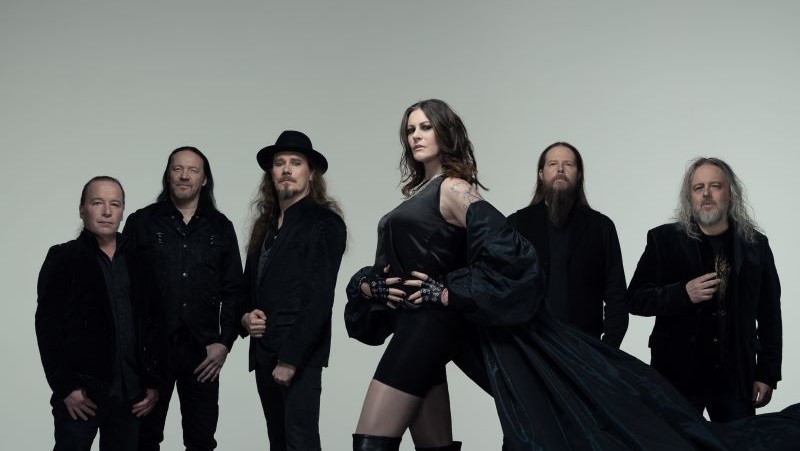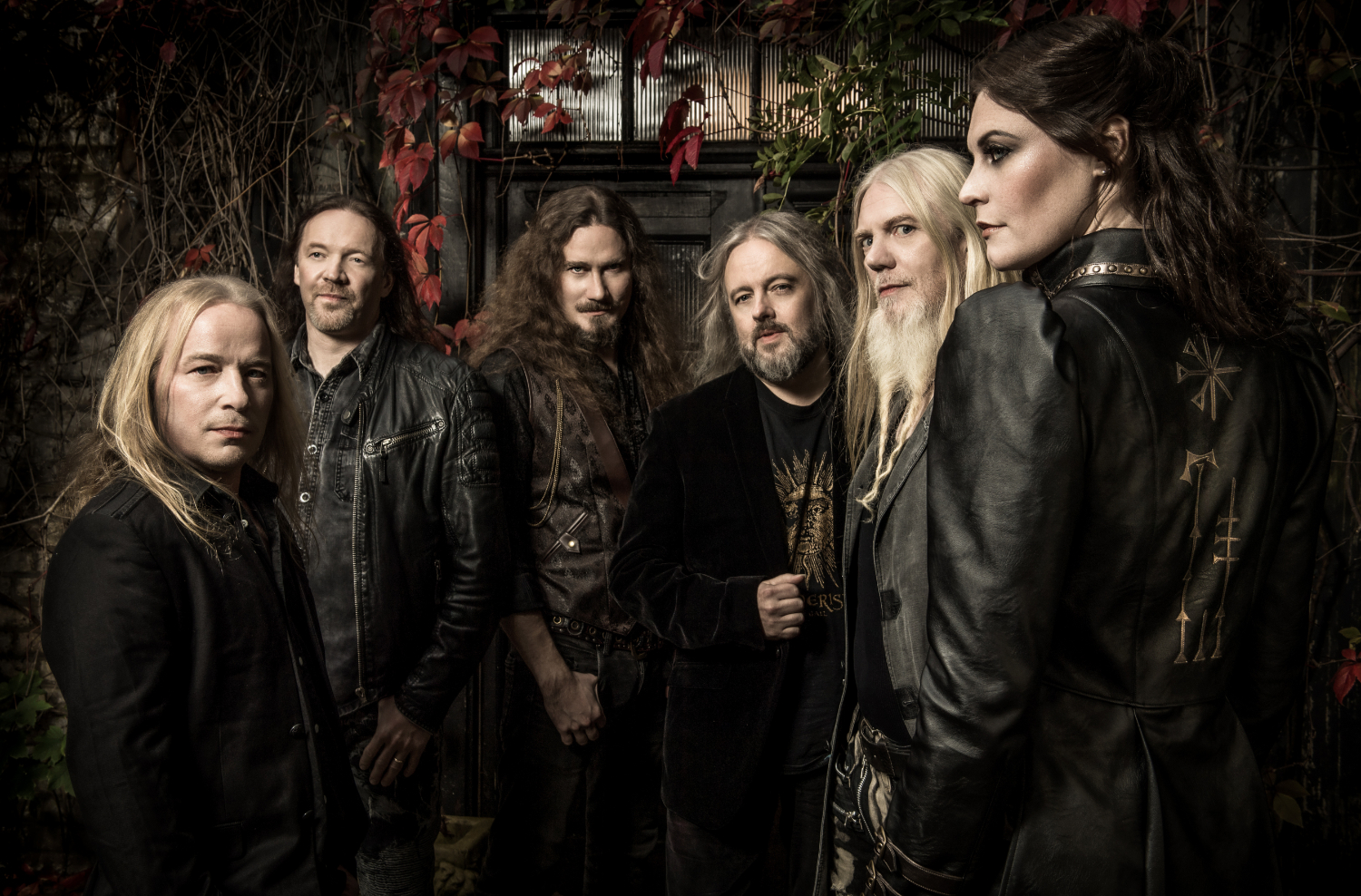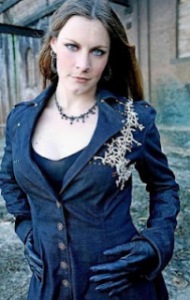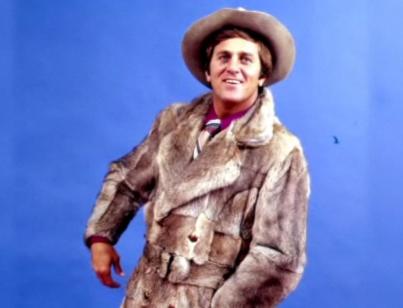Although I’ve largely avoided writing reviews this year, it was difficult to keep quiet about a new Nightwish album, because obviously they are a seminal band in symphonic metal, but also because they at one point delivered a legitimate album of the year in 2011 for Imaginaerum (in my revisionist, corrected list that is). Yet as opposed to just immediately writing an album review for Yesterwynde like everyone else, I wanted to let this thing digest for a bit internally, and for the dust to settle around it’s release as well. I’ve read scattered opinions on this album, the band’s first without bassist/co-vocalist Marco Hietala since 2001’s Wishmaster (which sounds unreal but yeah, its true), and have felt that a consensus has begun to emerge that largely centers on indifference from most. Yes the Nightwish faithful are still attenuated to Tuomas Holopainen’s lyrics here in a way that few other metal bands experience, but I was admittedly a little bit surprised at just how quickly this new album was listened to, commented on, and dismissed by the symphonic and power metal communities at large.
For all the criticism 2020’s Human. :||: Nature. received, it was the subject of furious discussion for weeks on end when it was released — granted we were all of us sitting at home because of the pandemic and had nothing but time on our hands, but I remember there being real agitation and annoyance at that album’s indulgences, at its underuse of Floor Jansen’s talent, its marginalization of Marco Hietala’s vocals, and its opulent instrumental second disc that gave new meaning to the term pretentious. But in the now month and a half that’s passed since Yesterwynde’s release, I’ve not seen the same amount of discussion about it anywhere really. The posts on various metal subreddits about the album aren’t tracking in the hundreds of comments a Nightwish album usually garners, the album got a cursory discussion in the r/PowerMetal discord, and I don’t recall anyone on Facebook or Twitter or Threads discussing it at length. I’ve come to sense that maybe, and this is just my admittedly singular perspective… most of the people out there that would have had an interest in Nightwish’s work previously have little to say this time around. So why the general indifference? Why not the tidal back and forth of opinions between those who find Nightwish can’t do much wrong versus those who think Tuomas has his head up you know where?

So I think the obvious culprit would be the music itself, which I will say off the bat is certainly an improvement over Human. :||: Nature (I really resent the punctuation in that album’s title). Wisely selected singles such as “Perfume of the Timeless” and “An Ocean of Strange Islands” are indeed made of the same ingredients that formulated so much vintage Nightwish of yore, though criticisms against their mixing are hugely warranted. Floor’s vocals were intentionally mixed lower on this album as an artistic decision, for what purpose I’m not entirely sure however. If you go on YouTube and search up “Perfume of the Timeless” remixed, a fan has uploaded a version where he boosted her vocals and lo and behold, it sounds dramatically more powerful than the album version, entirely more thrilling and Nightwish-y, but I digress. The other single, “The Day Of…” is less convincing however, and the more I’ve listened to it’s clunky mess of children’s choirs (a musical element Tuomas has overused by this point) and orchestral passages where the band practically disappears, the more I’m convinced this might be the second worst Nightwish single to date. If you’re wondering, “Noise” is easily the first in that ranking… they should do everything in their power to not promote something that dastardly again.
Stepping away from the singles, I actually found that I enjoyed part of “Sway” and much of the orchestral ballad “Lanternlight”, with the former being a close cousin to the twee Rusted Root vibes of “Harvest” on the previous album. I love the first few minute and a half of “Sway” in particular, with it being one of the few examples where I really feel that Troy had to have a lead vocal part, his gentle tone a perfect match for the hushed whisper the vocal melody is delivered in. It all gets a little messy during the middle sequence where they’re talking in grandiose tones about “the big reveal”… can we get back to the ballad please? Well they never do and the song dissolves into orchestral nothingness and four minutes feels like six and this is an opportunity wasted. On “Lanternlight”, I felt we got the closest to the Nightwish of olde, with Tuomas penning a heart on sleeve, lead vocal driven ballad that Floor genuinely shines on as a singer, her best moment on these past two albums. I think it works because it is so simple, the melody is allowed to flow unobstructed by any other elements jutting in unwelcomingly. As for everything else… well, “The Children of ‘Ata” had a solid chorus, an admirable lyrical sentiment that covered an interesting historical tidbit I had remembered reading about before, but that was it for positive takeaways.
I wrote in my review for Human. :||: Nature that Tuomas was “at his best when he allows himself to write in a pop songwriter mode first and foremost, and then colors in the details with metallic elements, with film soundtrack music, and with ancillary elements like the aforementioned tribal drumming or folk music”. All the progressive rock infusions that have swirled into the mix on these last two albums are pulling him away from his strength, and I think that no one is around to tell him as much (he certainly won’t discern this himself… this is what happens when others start calling you maestro and you don’t correct them). The first Floor album, Endless Forms Most Beautiful, worked really well because he essentially wrote simple, straightforward symphonic metal songs that were built on hooks and free flowing melodies. I remember remarking that it sounded at times like a throwback to Oceanborn, with a slight power metal tinge to it, and the lyrical theme of that album was the first dip into this pool of humanism and nature. It really worked. The thing that I ultimately came away with while listening to Yesterwynde was that Endless Forms aged really well, its directness very reminiscent of the sharpness of the band that wrote Imaginaerum, and that everything since has been a chore to sit and listen thru. I do think Marco’s missing vocal presence could have gone a long way in addressing that, the idea being that his voice almost demanded something more straightforwardly metal or more meat and potatoes so to speak, and with just Floor and Troy on vocals, there is a lack of this needed driving force.
I also wonder if the overwhelming indifference I’ve detected to this albums release is also a reaction to this being the third record in a row mining this particular subject matter. I know I’ve used the Green Day analogy before, that American Idiot was a fresh concept when it came out, but that same concept felt trite and overdone when they went with it again five years later on 21st Century Breakdown. Nightwish has described this as being the third and final album in a trilogy, so the good news here is that this particular vein should be exhausted by their own admission, that we can expect something new. In the process of preparing to write about this album, I listened to the previous albums in this trilogy back to back before listening to this one, and despite the quality gap between those two albums, the thing they share in common with Yesterwynde is that some of these songs are interchangeable from album to album. Something like “Sway” or “Harvest” could’ve been on any of these three albums, same for some of the other tracks, and so it calls into question the need for a trilogy — all are “positive” in tone, which has been the key talking point in the press interviews the band has given this time around. What was so different from album to album here that necessitated three albums worth of music digging into the same of inspiration that wasn’t already said on Endless Forms?
That lingering question is ultimately what Nightwish fans should be worried about. Did Tuomas extend this theme for so long because he’s at a loss of what to do otherwise? And now that its over, where does he go from here as a songwriter for this band? The standard advice he’d likely get from most critics is to return to something more personal and cut from the same cloth the older Nightwish classics were, but is that possible? Those albums were written from starkly personal places that fans love to speculate about (I will refrain here), and he’s older and at a different phase in his life. We’ve also seen less than stellar results when some other artists have attempted such a challenge, with the results being watered down or unconvincing. Its ironic that the older, more personal songs about longing and heartbreak and inner turmoil were more universally loved and adored than these songs addressing more universal, grander themes that should be applicable to all of us. But that’s an adage that has been around in all types of media, that audiences will respond to something they can identify with. Its why people love to talk about their favorite characters in movies, and not so much their favorite thematic material. I don’t have any answers for this lingering question, but I’ll be extremely interested in how Tuomas answers it.





 Few bands in metal have inspired the unrestrained devotion and adoration of it’s fanbase the way Nightwish have. Such a fiery bond is subject to various temperaments, as the band themselves found out through the course of two vocalist changes. That they are widely (if erroneously) recognized as the first female vocal led power/symphonic metal band only serves as fuel for this burning intensity. Their success in the late 90’s and early 00’s spawned countless imitators, other newly formed bands that wanted to put their own spin on what really did feel like a fresh style of metal, with inspired females keen to try their hand at singing over heavy guitars and sweeping orchestras. Ushered along by a signing craze from metal labels all over, female fronted metal bands went from a mere handful to a plethora in the blink of an eye. But few, if any of them have ever managed to attain the near mythic status and storied history of the mother of them all.
Few bands in metal have inspired the unrestrained devotion and adoration of it’s fanbase the way Nightwish have. Such a fiery bond is subject to various temperaments, as the band themselves found out through the course of two vocalist changes. That they are widely (if erroneously) recognized as the first female vocal led power/symphonic metal band only serves as fuel for this burning intensity. Their success in the late 90’s and early 00’s spawned countless imitators, other newly formed bands that wanted to put their own spin on what really did feel like a fresh style of metal, with inspired females keen to try their hand at singing over heavy guitars and sweeping orchestras. Ushered along by a signing craze from metal labels all over, female fronted metal bands went from a mere handful to a plethora in the blink of an eye. But few, if any of them have ever managed to attain the near mythic status and storied history of the mother of them all. For Nightwish fans, the announcement of Jansen brought along expectations that the band would make use of her operatic vocal capability on the new studio album, as she had demonstrated on several older songs on the tour. I myself took note of the general tone and tenor of the reactions on the band’s Facebook page around that time, and most of them were from fans salivating at the thought of a Wishmaster or Century Child sequel. Its likely that many long sundered fans of the band’s Turunen era were eyeballing Jansen as the closest possible thing to their dream reunion. As a bigger fan of the pop-vocal infused Olzon era, I too wondered how the band was going to balance their expanded musicality with the undeniable fan craving for hearing something soprano-oriented being belted out by Jansen. As heard in the Showtime, Storytime concert video, Jansen was able to bounce from one style to another in varying moments, though she typically stuck to her rock-inflected delivery. A retrospective viewing of that concert makes me realize that it was far more foretelling of what the new album would bring than anyone realized.
For Nightwish fans, the announcement of Jansen brought along expectations that the band would make use of her operatic vocal capability on the new studio album, as she had demonstrated on several older songs on the tour. I myself took note of the general tone and tenor of the reactions on the band’s Facebook page around that time, and most of them were from fans salivating at the thought of a Wishmaster or Century Child sequel. Its likely that many long sundered fans of the band’s Turunen era were eyeballing Jansen as the closest possible thing to their dream reunion. As a bigger fan of the pop-vocal infused Olzon era, I too wondered how the band was going to balance their expanded musicality with the undeniable fan craving for hearing something soprano-oriented being belted out by Jansen. As heard in the Showtime, Storytime concert video, Jansen was able to bounce from one style to another in varying moments, though she typically stuck to her rock-inflected delivery. A retrospective viewing of that concert makes me realize that it was far more foretelling of what the new album would bring than anyone realized. Perhaps its the largely uptempo feel of the album that’s responsible for the old-school resonance that I’m feeling. The band hasn’t done away with Dark Passion Play/Imaginaerum era live orchestras and cinematic arrangements, they’re still present and rather glorious in most moments, but they’re utilized this time more for amping up the energy of rollickingly speedy tracks like “Yours Is An Empty Hope”, “Weak Fantasy”, and the title track. This is a triumvirate of songs that underscore Holopainen’s gift as a songwriter, not in that he expertly juxtaposes soaring melodic ear candy over a frenetic rhythms but that he can do it in such diverse ways with varying degrees of heaviness and aggression. The vicious, snarling “Weak Fantasy” might be the best song on the album, with its tension building usage of solo string sections and a furious pummeling courtesy of pinch-hitting Wintersun drummer Kai Hahto. I get enthralled after the post-folk breakdown at 3:37 where the orchestra descends with a sweeping crescendo alongside Marco Hietala’s always wonderfully passionate vocals —- few others can pull off such riveting drama through the tenor of their voice alone.
Perhaps its the largely uptempo feel of the album that’s responsible for the old-school resonance that I’m feeling. The band hasn’t done away with Dark Passion Play/Imaginaerum era live orchestras and cinematic arrangements, they’re still present and rather glorious in most moments, but they’re utilized this time more for amping up the energy of rollickingly speedy tracks like “Yours Is An Empty Hope”, “Weak Fantasy”, and the title track. This is a triumvirate of songs that underscore Holopainen’s gift as a songwriter, not in that he expertly juxtaposes soaring melodic ear candy over a frenetic rhythms but that he can do it in such diverse ways with varying degrees of heaviness and aggression. The vicious, snarling “Weak Fantasy” might be the best song on the album, with its tension building usage of solo string sections and a furious pummeling courtesy of pinch-hitting Wintersun drummer Kai Hahto. I get enthralled after the post-folk breakdown at 3:37 where the orchestra descends with a sweeping crescendo alongside Marco Hietala’s always wonderfully passionate vocals —- few others can pull off such riveting drama through the tenor of their voice alone. The aforementioned “Élan” is effectively the same version as on the single, and within the context of the album it actually sounds better, though I’m less convinced of its effectiveness as the lead off single (“Alpenglow” would’ve been a better choice, a more daring yet similarly catchy cut). The thematic-bending “Edema Ruh” (something from a fantasy series I’ve never read) is an okay song with a relatively generic chorus (by Holopainen standards), but its slightly redeemed by some interesting guitar work by Vuorinen. And I’m torn about the sole ballad on offer, “Our Decades In the Sun”, because during the moments when its working it is as gorgeous and beautiful as anything the band has ever done. The problem might be that the song is too delicate for its own good, its sections often left without connecting musical glue, and the silky string arrangements unable to muster enough momentum to bind everything together. Its actually Vuorinen’s stormy guitar interjection at 2:07 that provides the song with its only dose of electrical current, a brilliant moment that ought to make you shiver. I enjoy listening to it overall, but its not in the ballpark of the band’s best ballads, and its a shame because it had the qualities to perhaps be their best.
The aforementioned “Élan” is effectively the same version as on the single, and within the context of the album it actually sounds better, though I’m less convinced of its effectiveness as the lead off single (“Alpenglow” would’ve been a better choice, a more daring yet similarly catchy cut). The thematic-bending “Edema Ruh” (something from a fantasy series I’ve never read) is an okay song with a relatively generic chorus (by Holopainen standards), but its slightly redeemed by some interesting guitar work by Vuorinen. And I’m torn about the sole ballad on offer, “Our Decades In the Sun”, because during the moments when its working it is as gorgeous and beautiful as anything the band has ever done. The problem might be that the song is too delicate for its own good, its sections often left without connecting musical glue, and the silky string arrangements unable to muster enough momentum to bind everything together. Its actually Vuorinen’s stormy guitar interjection at 2:07 that provides the song with its only dose of electrical current, a brilliant moment that ought to make you shiver. I enjoy listening to it overall, but its not in the ballpark of the band’s best ballads, and its a shame because it had the qualities to perhaps be their best. Everyone knows the story of Nightwish’s firing of original vocalist Tarja Turunen, and whether one agreed with the decision or not, it was undoubtedly one of the more brutal, ice-cold dismissals of a band member in rock and metal history (for those that forget, she got handed a pink slip type letter mere minutes after finishing a homecoming tour finale in Helsinki — a letter which was pointedly made public online for all to read). Now I felt that the band was justified in their aggressive action towards Turunen, as their reasons were sound and encompassed everything from attempted power grabs, threats of blackmail, interfering business manager/husband, canceling North American tours because the venues were small, and most egregiously, getting the band thrown off a tour with Iron Maiden. I’m thinking that kind of behavior would get you fired from most jobs, or in keeping with the spirit of the NFL football season, you don’t put yourself above or ahead of the team. That’s what Turunen did, and its what newly ex-vocalist Anette Olzon eventually did as well.
Everyone knows the story of Nightwish’s firing of original vocalist Tarja Turunen, and whether one agreed with the decision or not, it was undoubtedly one of the more brutal, ice-cold dismissals of a band member in rock and metal history (for those that forget, she got handed a pink slip type letter mere minutes after finishing a homecoming tour finale in Helsinki — a letter which was pointedly made public online for all to read). Now I felt that the band was justified in their aggressive action towards Turunen, as their reasons were sound and encompassed everything from attempted power grabs, threats of blackmail, interfering business manager/husband, canceling North American tours because the venues were small, and most egregiously, getting the band thrown off a tour with Iron Maiden. I’m thinking that kind of behavior would get you fired from most jobs, or in keeping with the spirit of the NFL football season, you don’t put yourself above or ahead of the team. That’s what Turunen did, and its what newly ex-vocalist Anette Olzon eventually did as well. Okay, so with the facts laid out, here’s two immediate things to take away from this: One — That getting a European based vocalist such as Floor Jansen to come in to rather suddenly be the Nightwish touring vocalist for the October 1st show in Seattle, WA is no mere twenty-four hour task. This must have been in the works for at the very least many days to possibly weeks now — because think on it, you’re counting on time for work visas, travel arrangements, travel time, and obviously, enough time for Jansen to be familiar with at sixteen to seventeen songs in the setlist. Things like that do not happen overnight. Olzon’s last show was on September 29th — so the fact that they’re apparently going to pull this off is either incredibly impressive or downright miraculous. Two — That after what they’ve been through with Turunen, Nightwish don’t play around — if you’re not a team player, you’re out. And you know what? I completely understand and support their mentality.
Okay, so with the facts laid out, here’s two immediate things to take away from this: One — That getting a European based vocalist such as Floor Jansen to come in to rather suddenly be the Nightwish touring vocalist for the October 1st show in Seattle, WA is no mere twenty-four hour task. This must have been in the works for at the very least many days to possibly weeks now — because think on it, you’re counting on time for work visas, travel arrangements, travel time, and obviously, enough time for Jansen to be familiar with at sixteen to seventeen songs in the setlist. Things like that do not happen overnight. Olzon’s last show was on September 29th — so the fact that they’re apparently going to pull this off is either incredibly impressive or downright miraculous. Two — That after what they’ve been through with Turunen, Nightwish don’t play around — if you’re not a team player, you’re out. And you know what? I completely understand and support their mentality.


